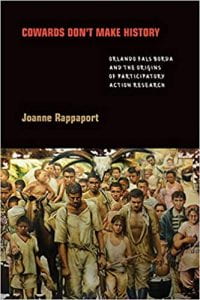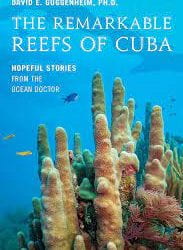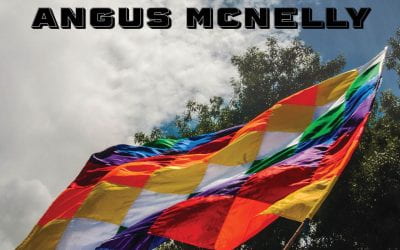Beyond the Sociology Books
A Review by Michael J. LaRosa

Cowards Don’t Make History: Orlando Fals Borda and the Origins of Participatory Action Research by Joanne Rappaport. (Durham: Duke University Press, 2020, p. 286.)
If you are not from Colombia and hoping to understand the South American nation of 50 million souls, you might tend to focus on “Colombia the terrible”—narcotics and decades of socio-political violence. Or you might concentrate on its “light but joyful” aspect, represented by Shakira, James Rodríguez, Sofía Vergara and Lido Pimienta or on the country’s literature, best-known for Nobel Prize winner Gabriel García Márquez. But it’s quite likely you may never have heard about a leading 20th-century sociologist, Orlando Fals Borda (1925-2008).
Fals, a truly original thinker, joins a long list of contemporary Latin American intellectuals from a variety of disciplins such as Brazilian educator Paulo Freire, Argentine economist Raúl Prebisch, Peruvian theologian Gustavo Gutiérrez and from an earlier period, Cuba’s José Martí—all towering figures widely known outside their nations of origin.
Joanne Rappaport, an anthropologist by training, has patiently researched and written a new monograph that helps both Colombian and non-Colombian students, scholars and activists reflect upon and re-think the enormous contributions of an energetic, creative and committed Colombian social scientist.
I met Orlando Fals Borda as a graduate student at the University of Miami in the early 1990s. I was struck by his calm and optimism during a very dark period in Colombia’s contemporary history. He was speaking at the Law School, probably at the time of Colombia’s National Constituent Assembly which resulted in adoption of the new, more modern Constitution of 1991. Fals served on that Assembly. He had deep ties to Florida and the United States, earning his Ph.D. in sociology (1955) under the guidance of T. Lynn Smith at the University of Florida, Gainesville. He returned to Bogotá to found the Department of Sociology at the National University in 1959. The public university’s new sociology division was funded, partially, through grants from the Ford and Rockefeller Foundations. These wealthy foundations, after the 1959 Cuban Revolution, were determined to rescue Latin America through gradual “developmentalist” models. Sociology offered clear methodologies to study rural and urban Latin America while offering “solutions” to the pressing social problems such as clean water, plumbing, education and housing.
Father Camilo Torres Restrepo, who eventually died in active combat fighting with the insurgency group, the National Liberation Army (ELN) in 1966, was Fals’s colleague and to some degree, disciple at the National University; Torres was one of the first professors at the new faculty to take students out to conduct field work in the poor neighborhoods surrounding the nation’s capital.
Fals was an ideal interlocuter for the wealthy American foundations, and, in fact the United States government considered Colombia an ideal partner in the fight against the American obsession of the time: Communism. As a U.S.-trained scholar, Fals worked in a nation with a decidedly pro-U.S. managerial class. John F. Kennedy visited Colombia in December 1961 and supported the construction of “middle class housing” now called “Barrio Kennedy” on the western fringes of Bogotá in 1961. He also sent in Peace Corps volunteers that same year and in fact, Colombia was the first nation in the hemisphere to receive the Peace Corps.
Rappaport’s monograph focuses on none of the above. The “history” outlined in the previous paragraphs is widely known and documented. Instead, Joanne Rappaport, a Professor of Latin American Literature and Cultural Studies at Georgetown University, studies the creation and implementation of Participatory Action Research (PAR), whereby academically trained scholars share the research territory with collaborators, activists and the research “subjects,” all of whom became active participants. Fals didn’t invent PAR, but he embraced it, especially during the time spent on the north coast of Colombia, near his native city of Barranquilla.
An indefatigable and innovative scholar, Fals published monographs in the United States with university presses, he helped Colombians understand the “Violence” in their own land by publishing La Violencia en Colombia in 1962 with the jurist Eduardo Umaña and the prelate Germán Guzmán; he contributed a remarkably creative, four volume Historia doble de la costa whereby—in the first volume—he created two distinct “tracks” (one on the left hand page, the other on the right), recounting the same story for different audiences. The left side was descriptive, the right, more analytical/theoretical. Historians–most notably the late, great Charles Bergquist–grumbled that the work wasn’t grounded thoroughly enough in historiography, but Fals was a rule-bender, an iconoclastic thinker and a man more comfortable with el pueblo than the scholar class.
Rappaport focuses on Fals’ formation as activist, and the collaborative research that developed during the period from 1971-74 when he formed a group called “la Rosca de Investigación y Acción Social” or the Circle of Research and Social Action. “La Rosca” in Colombian Spanish refers to a “coil” of people who are tightly unified by a cause—a rosca is, by its nature, exclusive and exclusionary. La Rosca was committed to pushing a revolutionary agenda in a place long accustomed to abuses by the landholding elite and their allies, together with the foreign multinational corporations that dropped in, took the resources and left nothing behind except poverty and misery. Gabriel García Márquez’s first novella, La Hojarasca [1955] tells that story and was translated to English as Leaf Storm.
Rappaport is uniquely situated to study Fals, his activities on the coast and his multiple and evolving history of academic engagement. She has a long, distinguished career as a “Colombianist”—a scholar committed to the nation of Colombia, focused on the people who live there. She has deep academic ties with the country and her books have studied memory, meaning, documentation, oral tradition, theater, art, and folkways. Two of her more important works, The Politics of Memory: Native Historical Interpretation in the Colombian Andes (1990), followed up three years later with Cumbe Reborn, established Rappaport as a major theoretician, anthropologist and practitioner of PAR.
Thankfully, Joanne Rapaport migrated from the southwest Andes to the north coast of Colombia. True to her nature, she carefully focused on the papers and other documents left behind by Fals—most of her archival work was conducted in Montería (Córdoba) and at the National University in Bogotá—a significant site for researching Orlando Fals Borda.
The author dedicates her most recent book to the memory of Ulianov Chalarka, a painter and caricaturist who drew all of the historical comics that form a significant segment of the text. Chalarka grew up in Montería and many of his didactic drawings are studied by the author and, to some degree, drive the book’s narrative. These historical comics are fantastic teaching tools for people without access to a university education, or any type of formal, western education. The comics were clearly drawn and used to tell the stories of the past, but without the jargon, theoretical underpinnings or formal language of the scholar. A particularly effective drawing is reproduced on page 121—a three panel drawing that crisply describes “How the peasants transformed their environment over time” … (p., 120) and is one of 19 comics/drawings Rapaport analyzed.
This book is for the specialist but will find wide appeal across the social sciences; sociologists will read the book, as well as anthropologists, historians and folks interested in graphic novels/comics as sources. Students of popular education and innovative pedagogy will want to read this book. The book will also find readership among those interested in the early workings of the National Association of Peasant Users (ANUC) and “La Fundación del Caribe,” the organization, founded in 1972, that drew together young activists and researchers working on the Caribbean coast.
La Fundación was primarily tasked with preventing land-grabs by local elites and their allies—elites long accustomed to having their way and expanding their holdings on the coast. Chapter two is a remarkable review of the Fals archives–a model chapter, Rappaport assiduously studies the archives, in active collaboration with local residents/students and activists. Her integration into these communities feels genuine and authentic.
Joanne Rappaport’s remarkable book helps readers, scholars and others understand the legacy, the significance and the unique contributions of Orlando Fals Borda. The book is not, by any means, hagiography. Rappaport, an unusually creative scholar, found solace in an equally gifted communicator/scholar and unveiled for the reader the multiple levels of Fals’ scholarship, inclusive pedagogy and activism. Rappaport’s work forces researchers and scholars outside of Colombia to think more critically about scholarship and activism. Rappaport asks significant questions about “the territory” of academic research in modern times. How do scholars work? How do we write? How should scholars communicate? Is our research too narrow, too parochial, too out of touch with the people? Is the academic monograph really the only way to communicate? Could more of us practice PAR?
Joanne Rappaport–reporting through the north coast, also know as the Caribbean coast, at a critical moment in contemporary Colombian history—offers a path forward for these and other questions. She introduces us to a strong cast of characters, and a treasure trove of documentation, together with remarkable grassroots intellectuals, all framed around the priorities and activist agenda of Colombia’s Orlando Fals Borda. Joanne Rappaport, and Orlando Fals Borda, encourage us all to drop the academic pretense and jargon so we can spend more time focusing on, respecting, including and traveling with our fellow human beings.
Michael J. LaRosa is an associate professor of history at Rhodes College. He authored (with Germán R. Mejía) the 2012 textbook Colombia: A Concise Contemporary History. LaRosa serves as series editor for “Tópicos,” published through Routledge.
Related Articles
A Review of The Remarkable Reefs of Cuba: Hopeful Stories From the Ocean Doctor
It feels as though work takes up more and more of our lives, expanding into time it never used to touch.
A Review of Now We Are in Power: The Politics of a Passive Revolution in Twenty-First Century Bolivia
In Now We Are in Power, Angus McNelly provides an incisive examination of Bolivia’s complex political trajectory under Evo Morales, analyzing it through the lens of Antonio Gramsci’s seminal concept of “passive revolution.”
A Review of Roots of Resistance: A Story of Gender, Race, and Labor on the North Coast of Honduras
Once home to sprawling banana plantations under the control of U.S. multinationals, the history of the northern coast of Honduras is crucially bound with capitalist exploitation and extraction.




